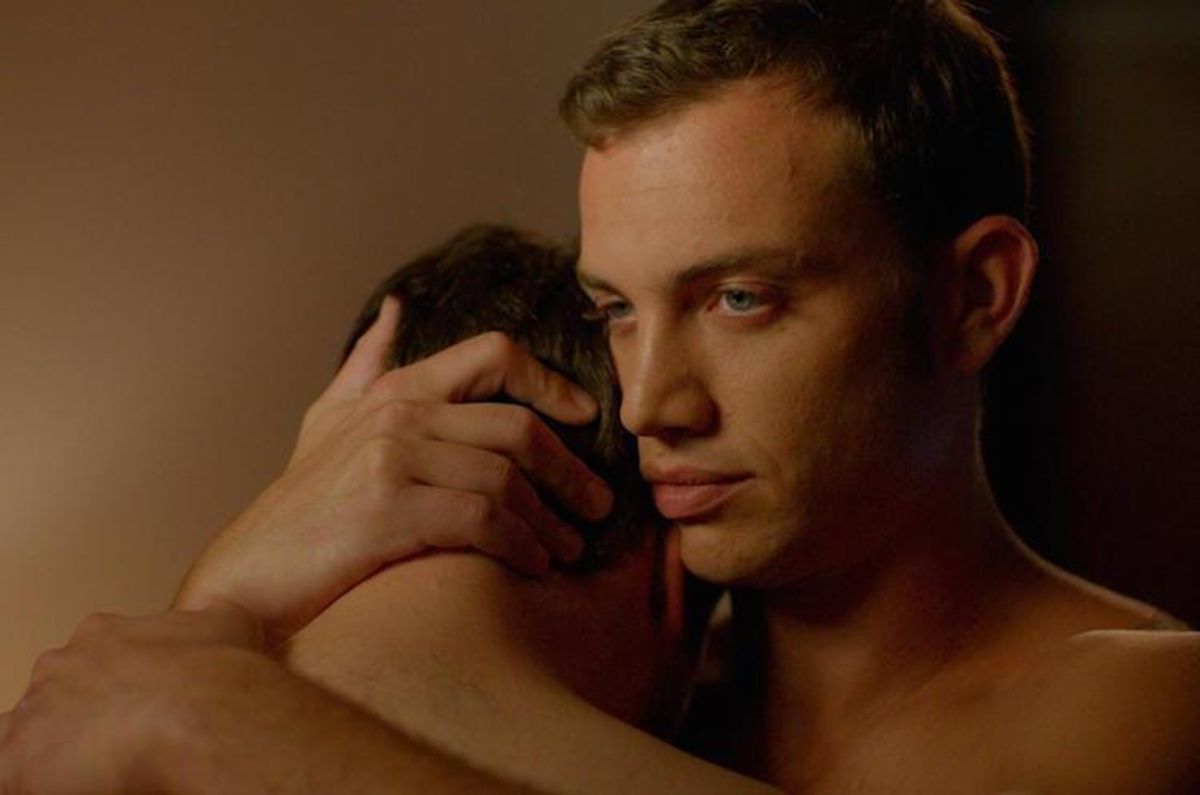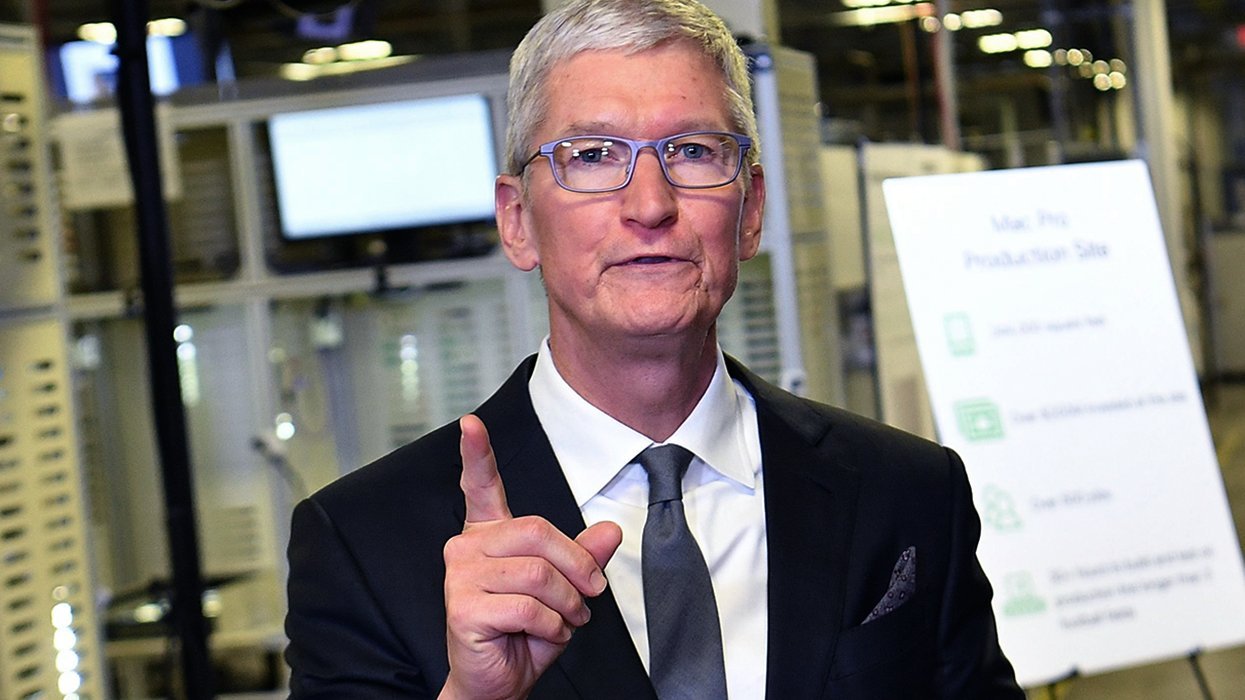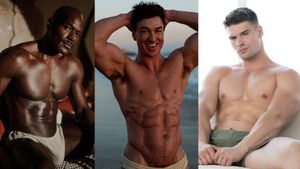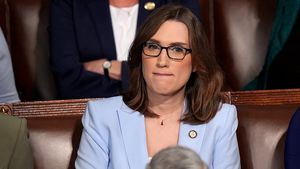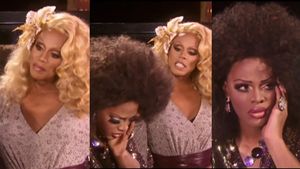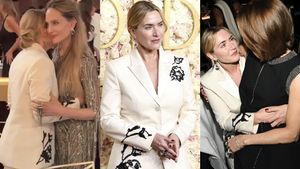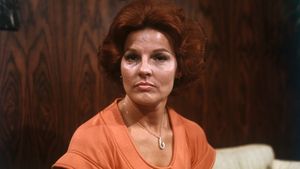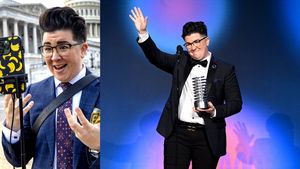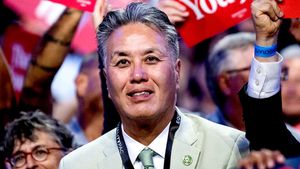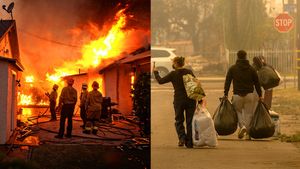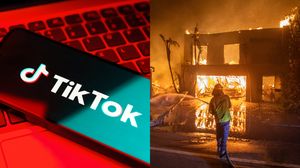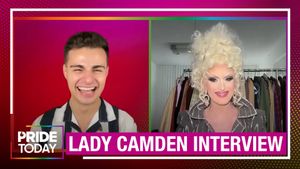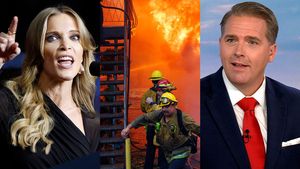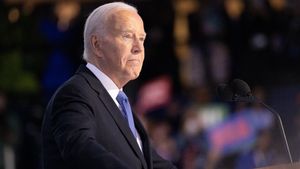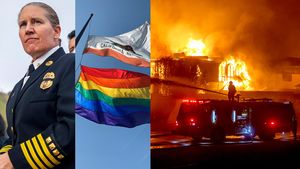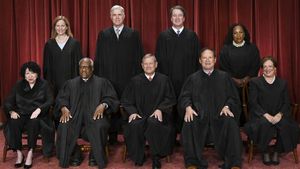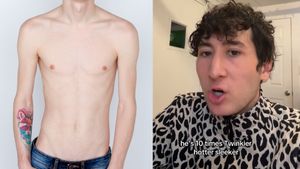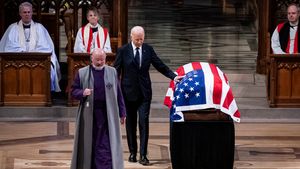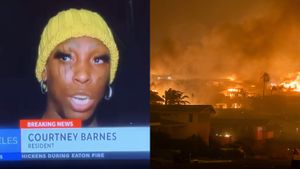When I came out to a friend during my sophomore year of high school, we were pumping gas at a local station in town. She was a member of my Baptist church, and her father was a leader in our congregation. I told him that I was queer over the phone. Because I was fifteen and new at this, I felt I needed the church's blessing to be the person I was. I asked if I was going to hell. Her father laughed and said, "No more than I am." This was a surprise to me. I thought he would scream, and I thought his daughter would, too.
Instead we got back in her car and sat in silence. The air was heavy with her unspoken thoughts, as well as everything I hoped she wasn't about to say. Instead there was a rush of air as if she'd been holding her breath this entire time. It could have been minutes, but maybe it was just a few seconds. "It's just such a lonely life," my friend sighed.
When I went down my checklist of family and friends to come out to, it was just four years after Matthew Shepard was killed. Two years before I came out to my mother in a handwritten note, because I was too scared to say it out loud, Hilary Swank won an Oscar for playing Brandon Teena, a Nebraska man who was raped and murdered for being transgender, in Boys Don't Cry. I bought the VHS copy shortly after it became available at our local Blockbuster Video. What kept me in the closet until then was the fear of being beaten or left to die, just another headline in someone's local newspaper.
But when I came out to people, they didn't worry about my safety. I constantly heard about how miserable gay life was.
Most memorable was a speech from the head pastor in my church. We went for a long drive where we split McDonalds french fries and made small talk about Viggo Mortensen before pulling into his office. He sat me down on a cold chair and told me that if I chose this path, I would be doomed to a "lifetime of unhappiness." Giving me brochures on higher rates of HIV among gay men, he said that homosexuality--as a "lifestyle choice"--was inherently broken. I would, thus, become broken.
"God is waiting to cut you down with a sniper rifle," my pastor said.
On a surface-level analysis, a recent essay published in The Huffington Post would appear to prove them right. "Together Alone" is a moving account of the isolation and alienation experienced by many gay men who were promised the benefits of a societal shift toward equality but have felt there remains something missing. With an anthropologist's eye, writer Michael Hobbes speaks to gay men who, like himself, didn't grow up bullied and oppressed. One of his subjects is the son of a lesbian mother who came out to him when he was 12 years old.
That kind of hot-button inquiry is likely to provoke debate, and it already has in gay circles. While it has resonated with the experiences of some men who have struggled to find their place in the gay scene, Slate's Ben Miller claims that the essay "focuses on a very specific sub-group and leaves out everyone else." He claims that it too narrowly zeroes in on "A-gays." That term is what heterosexuals might describe as a "man about town:" someone attends the opening of the hottest new bar in town and is up for Sunday brunch the following morning. He's working on his beach body and doesn't eat carbs. The forthcoming LOGO show, Fire Island, might be his biopic.
Related | How Do You Make the Perfect Gay Reality Show?
Even so, many of the chiseled torsos looming on Grindr are no more depressed than anyone else--gay or straight. They're looking for love and not finding it or maybe they've discovered the secret to life and the rest of us just don't know it yet. What's missing from "Together Alone" is that despite the myriad challenges many LGBTQ people face, many of us are thriving. We are living content, fulfilling lives that go just as unexamined as the men Hobbes interviewed.
It's important to recognize and talk about the loneliness epidemic that has plagued LGBTQ people for decades as we struggle for visibility, comfort and acceptance. But recognizing and celebrating gay happiness is just as important.
***
The conservative appropriation of "Together Alone" was a matter of time, and it's surprising that it took the religious right three whole days to get to it. Michael Brown, a writer for Town Hall, claimed that the essay is proof that homosexual relationships are "intrinsically unfulfilling."
" Gay sex will always have more health risks than straight sex (speaking in general terms, since there is obviously overlap in some of the practices and habits), gay couples will never have as many children as straight couples (which has many other social implications), and two men or two women cannot possibly experience the fullness found in a healthy male-female relationship," Brown argues. "It simply the way God made us, and it makes perfect sense."
But Hobbes' work is anything but an advertisement for Exodus International, the now defunct ex-gay organization. Instead his essay complicates the traumas that gay men face, which have long been viewed solely through a "minority stress" model. Because many queer men face rejection in their homes and discrimination in their daily lives, these factors have been seen as contributing to higher rates of risky sex, drug abuse, alcoholism among LGBTQ people--which are true across the board, not just in gay men. Transgender people are burdened with the nation's highest suicide rate.
Those phenomena, though, can't be explained away as solely the product of bigotry, and we need to explore other reasons that gay men, for example, face a disproportionate risk of developing an eating disorder than their heterosexual male peers.
Hobbes believes that the answer can be found in the gay community itself. When you come out as a gay man, you're told to find your people, which often means seeking out the comfort of strangers in neighborhoods like Chelsea and the Castro district. When I moved to Chicago at 17, my first stroll down Halsted Street, the main strip of the city's Boystown neighborhood, was life-giving. Dressed in a Fender t-shirt and a fur-lined corduroy jacket I got at a thrift store, I felt wanted and validated by the knowing glances of the men who watched me pass, like I had finally found the home I was looking for.
But the reality can be jarring for some.
"It's like you emerge from the closet expecting to be this butterfly and the gay community just slaps the idealism out of you," one interviewee told Hobbes. "I went to West Hollywood because I thought that's where my people were. But it was really horrifying. It's made by gay adults, and it's not welcoming for gay kids. You go from your mom's house to a gay club where a lot of people are on drugs and it's like, this is my community? It's like the fucking jungle."
Gay bars, for their many virtues, have always been an incomplete answer to the problem of community. These watering holes first developed in queer enclaves like Greenwich Village and Provincetown so that people would have a safe place to meet others like them--to drink, to talk, and maybe even go home together. In their infancy, they also acted as spaces for political organizing and action. After police raided San Francisco's Black Cat Bar in 1967, patrons protested outside of the establishment holding signs that read "Police Lawlessness Must Be Stopped" and "Blue Fascists Must Go!"
Although going to our local club might make us feel more connected to LGBTQ history, it doesn't always make us feel more connected to ourselves. The experience of putting yourself out there and getting turned down, especially if you're young and haven't hardened to rejection, can be a soul-crushing one. Some of us may come to believe that leaving the bar by ourselves at the end of the night, after guests take one last look around the room at happy hour, is a public referendum on our value. That lesson too often sticks.
It doesn't help that many of these spaces are disappearing, especially for queer women. This leaves LGBTQ youth with far fewer opportunities to seek out a physical community, even an imperfect one. You're left with Grindr and Scruff, which are more time-killers than they are a way to meet friends or potential mates. Grindr estimates that the average user spends two hours a day on the hookup app, which can be a lot of work for little benefit.
But what Hobbes leaves out is just as important as the data he addresses. While a great deal of LGBTQ people are dealing with enormous burdens, whether that's the lack of supportive community or few possibility models in our own lives, studies show that gay men manage to find joy and fulfillment--even despite the odds.
PlanetRomeo, a dating app based in the Netherlands, conducted a survey of 115,000 gay men around the world in 2014, finding that respondents were the most happy in countries with strong legal and social support systems for LGBTQ people. These countries are mainly concentrated in Scandinavia, which has long led the way in equality: Iceland, Norway, Finland, and Sweden. Iceland, who boasted the world's first openly queer Prime Minister, Johanna Sigurdardottir, legalized marriage equality in 2010. On the app's Happiness Index, the United States placed all the way down at no. 26.
But even queer people in the U.S. can take comfort in knowing that LGBTQ folks may not be as melancholy as you think. A 2013 study published in Psychosomatic Medicine found that out gay men were less likely than their heterosexual counterparts to experience depression.
Those findings, courtesy of researchers at the University of Montreal, have been contested, but their tentative conclusions should be a reminder of something that many of us already know: LGBTQ people are incredibly, powerfully, resplendently resilient. And they react to the challenges posed by the lack of community, as well as the constant political opposition LGBT folks face, by getting creative.
Some queer youth leave small towns where they are harassed and ostracized by peers and build a chosen family for themselves. Others work toward a more inclusive community by creating spaces where they feel accepted and validated for who they are--even if they don't fit someone else's standard of what attractive is. Spaces like Chances Dances in Chicago, Be Cute in New York, Sugar Town in Portland, and Powder Room in Atlanta have grown out of the need for diverse spaces for diverse types of people. Many may feel perfectly at home (and yes, happy!) at the P-Town barbeque--their oiled chest bared for all to see. Others may not. Such is life.
There are just as many success stories as there are cautionary tales. When I moved to New York two years ago, I was informed it was the belly of the loneliness beast: No one knows their neighbors, and it's difficult to meet people. We're all just work robots shoved in tiny boxes who toil away at our desks and sleep.
But I met my partner the first week I moved into my apartment. We began chatting on Scruff, and he told me he liked Bringing Up Baby on our first date to the Brooklyn Museum. That got him a second date. Three weeks later he helped me take my dog to the vet when she began to have unexplained seizures. She was a rescue, and being new at dog parenting, I called him crying, not knowing what to do. I knew I was already falling in love with him because he was the first person I thought to call. Six months later we moved in together. He makes me soup when I work too late, and when his dad passed away last year, I wrote the eulogy.
This isn't the life I was told I would have. I have a good job, a good apartment, and good friends, many of whom are also leading healthy and successful lives. It took years of struggle and lots of mistakes for me to get there, and I'm sure it did for them, too. I've been unsure about myself and scared I would never figure out how I fit in with those around me. I drank too much and made the wrong choices with the wrong people. I still make my share of bad decisions, but it doesn't make me lonely--it makes me human.
Finding what makes us happy is a process, and it's different for everyone. But when we treat our triumphs like an outlier, we only make the problem worse.
